|
|
|
Sort Order |
|
|
|
Items / Page
|
|
|
|
|
|
|
| Srl | Item |
| 1 |
ID:
177574
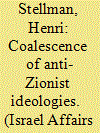

|
|
|
|
|
| Summary/Abstract |
This article examines the coalescence of the main anti-Zionist ideologies: Left, Jewish, Christian, Arab/Muslim and Conspiracy anti-Zionism. After a definition of anti-Zionism, its relationship to antisemitism and an overview of the historical origin of the coalescence drive, the article shows the extent of the synergy between representatives of the main anti-Zionist ideologies. It concludes that the accusation of a global conspiracy ascribed by antisemites to Zionism and Judaism can be turned on its head: it is in fact a feature of anti-Zionist ideologies that are otherwise in existential struggle with each other.
|
|
|
|
|
|
|
|
|
|
|
|
|
|
|
|
| 2 |
ID:
192478
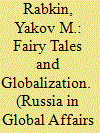

|
|
|
|
|
| Summary/Abstract |
Globalization, albeit no longer so global these days, affects children’s
values, self-images and world outlook through targeted marketing of
fairy tales, games and assorted media products. This article analyzes
these effects and proposes to those concerned a number of measures to
counteract them.
|
|
|
|
|
|
|
|
|
|
|
|
|
|
|
|
| 3 |
ID:
171252
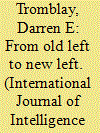

|
|
|
| 4 |
ID:
160424
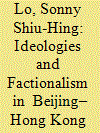

|
|
|
|
|
| Summary/Abstract |
Clashes between the ideologies of pro-Beijing nationalism and pro–Hong Kong localism have become far more prominent in the Hong Kong Special Administrative Region since 2013. This article explores the origins, content, and impact of the ideological conflicts between Beijing and Hong Kong.
|
|
|
|
|
|
|
|
|
|
|
|
|
|
|
|
| 5 |
ID:
000582
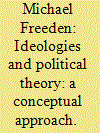

|
|
|
|
|
| Publication |
Oxford, Clarendon Pr., 1996.
|
| Description |
xx,592p.
|
| Standard Number |
0-19-827532-3
|
|
|
|
|
|
|
|
|
|
|
|
Copies: C:1/I:0,R:0,Q:0
Circulation
| Accession# | Call# | Current Location | Status | Policy | Location |
| 041964 | 320.5/FRE 041964 | Main | On Shelf | General | |
|
|
|
|
| 6 |
ID:
153946
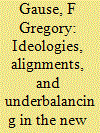

|
|
|
| 7 |
ID:
142114
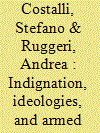

|
|
|
|
|
| Summary/Abstract |
Ideas shape human behavior in many circumstances, including those involving political violence. Yet they have usually been underplayed in studies of the causes of armed mobilization. Likewise, emotions have been overlooked in most analyses of intrastate conflict. A mixed-methods analysis of Italian resistance during the Fascist regime and the Nazi occupation (1943–45) provides the opportunity to theorize and analyze empirical evidence on the role of indignation and radical ideologies in the process of armed mobilization. These nonmaterial factors play a crucial role in the chain that leads to armed collective action. Indignation is a push factor that moves individuals away from accepting the status quo. Radical ideologies act as pull factors that provide a new set of strategies against the incumbent. More specifically, detachment caused by an emotional event disconnects the individual from acceptance of the current state of social relations, and individuals move away from the status quo. Ideologies communicated by political entrepreneurs help to rationalize the emotional shift and elaborate alternative worldviews (disenchantment), as well as possibilities for action. Finally, a radical ideological framework emphasizes normative values and the conduct of action through the “anchoring” mechanism, which can be understood as a pull factor attracting individuals to a new status.
|
|
|
|
|
|
|
|
|
|
|
|
|
|
|
|
| 8 |
ID:
172885
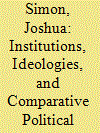

|
|
|
|
|
| Summary/Abstract |
The growing prominence of comparative political theory has inspired extensive and fruitful methodological reflection, raising important questions about the procedures that political theorists should apply when they select texts for study, interpret their passages, and assess their arguments. But, notably, comparative political theorists have mainly rejected the comparative methods used in the subfield of comparative politics, because they argue that applying the comparative method would compromise both the interpretive and the critical projects that comparative political theory should pursue. In this article, I describe a comparative approach for the study of political ideas that offers unique insight into how the intellectual and institutional contexts that political thinkers occupy influence their ideas. By systematically describing how political thinking varies across time and over space in relation to the contexts within which political thinkers live and work, the comparative method can serve as the foundation for both deconstructive critiques, which reveal the partial interests that political ideas presented as universally advantageous actually serve, and reconstructive critiques, which identify particular thinkers or traditions of political thought that, because of the contexts in which they developed, offer compelling critical perspectives on existing political institutions.
|
|
|
|
|
|
|
|
|
|
|
|
|
|
|
|
| 9 |
ID:
046640
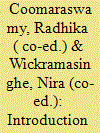

|
|
|
|
|
| Publication |
DelhI, Konark Publishers Pvt Ltd., 1994.
|
| Description |
v, 147p.
|
|
|
|
|
|
|
|
|
|
|
|
Copies: C:1/I:0,R:0,Q:0
Circulation
| Accession# | Call# | Current Location | Status | Policy | Location |
| 045861 | 302.15/COO 045861 | Main | On Shelf | General | |
|
|
|
|
| 10 |
ID:
141613
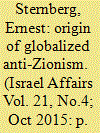

|
|
|
|
|
| Summary/Abstract |
The primary cause of global anti-Zionism can be found in the convergence of the post-Cold War crisis of Islam, the crisis of the post-communist Left, and Europe's civilizational crisis. Seeking new global visions for radical change, groups with discrepant agendas found solidarity through shared hatred of a fiendish entity, the one on which the alleged depredations of globalized, militarized capitalism could be blamed. Petrodollar and charity funding to defame Israel, media bias meant to do the same, and academic anti-Zionism are secondary phenomena, emanating from this global convergence.
|
|
|
|
|
|
|
|
|
|
|
|
|
|
|
|
| 11 |
ID:
124136
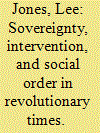

|
|
|
|
|
| Publication |
2013.
|
| Summary/Abstract |
This article explores how sovereignty and (non-)intervention are implicated in the (re)production of specific social orders. Sovereignty and the non-interference principle circumscribe 'domestic' politics from 'the international', defining who is legitimately included or excluded from the struggles that determine political and social orders. State managers seek to admit forces and resources favourable to the order they are seeking to create, whilst excluding those deleterious to it. In revolutionary periods, however, these attempts to 'cage' social relations often crumble as transnational forces engage in fierce, multifaceted conflicts overlapping territorial borders. In such circumstances, both norms of non-interference and practices of intervention may be used by dominant forces to help contain the spread of sociopolitical conflict and to strengthen their hand in the struggle to (re)define social order. Sovereignty regimes are thus shaped by the strategies and ideologies of the various social groups locked in conflict at a particular historical moment. This argument is illustrated through the case of Cold War Southeast Asia, where sovereignty and intervention were both used to stabilise capitalist social order and curtail transnational, radical threats from below.
|
|
|
|
|
|
|
|
|
|
|
|
|
|
|
|
|
|
|
|
|